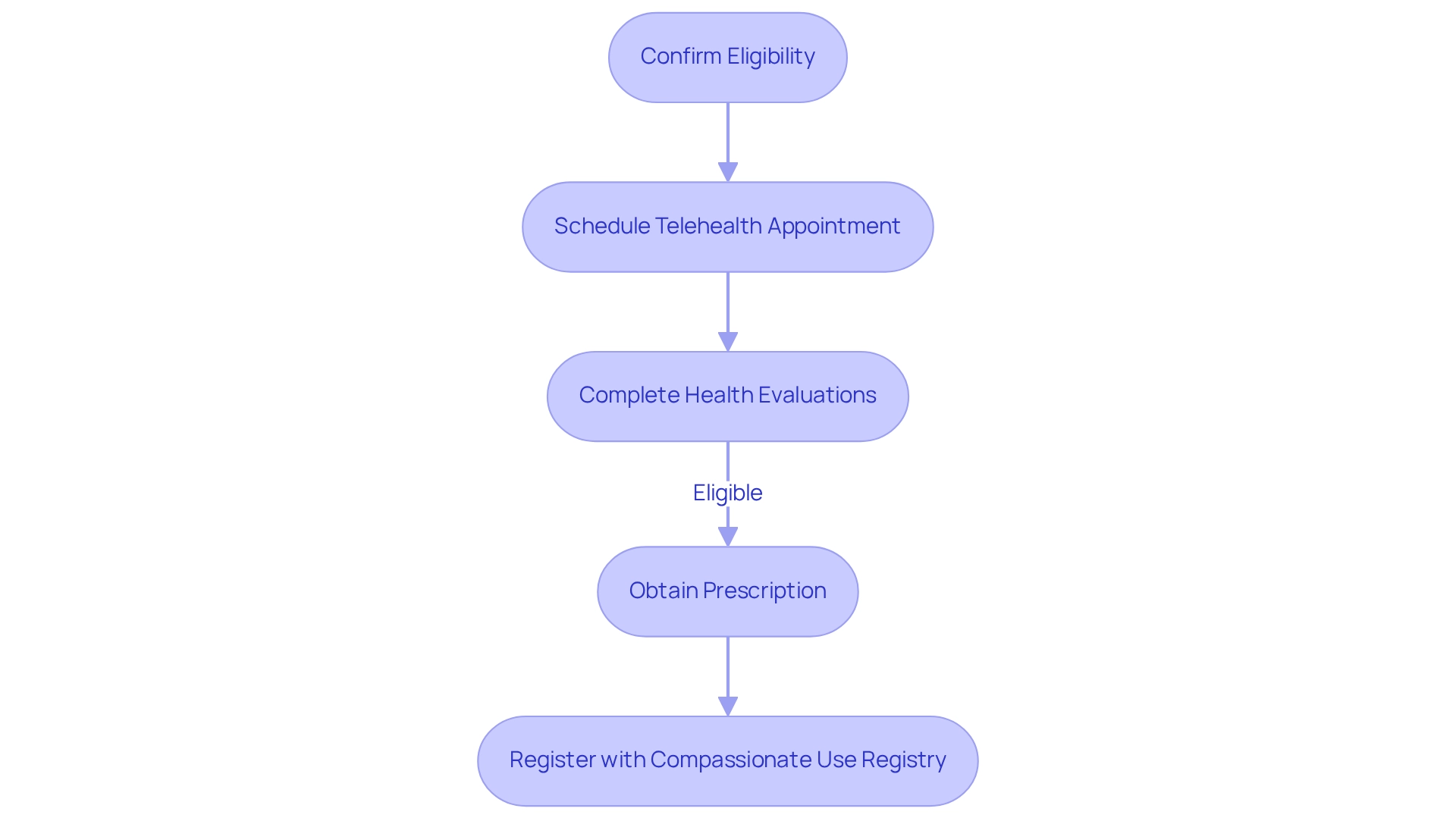Is Medical Marijuana Legal in Texas 2024? Your Essential Checklist
by Maya Green · April 6, 2025
Explore the legal status of medical marijuana in Texas for 2024 and understand your options.

Overview
As of 2024, medical marijuana is legal in Texas, providing hope for many individuals seeking relief. However, it is important to understand that this access is regulated under the Compassionate Use Act, which permits low-THC cannabis for specific qualifying health conditions. While this is a positive step forward, many patients may still face challenges in accessing the care they need.
It’s heartening to know that access has improved for certain patients, yet ongoing legislative discussions hold the potential to further expand qualifying conditions and consumption methods. This reflects the evolving legal landscape surrounding medical cannabis in our state, and it’s crucial to stay informed about these changes.
You may find that these developments bring renewed hope for better options in managing your health. As we navigate this journey together, it’s essential to advocate for yourself and others who may benefit from expanded access to medical cannabis. Remember, your voice matters in shaping the future of healthcare in Texas.
Introduction
As the landscape of medical marijuana continues to evolve in Texas, it’s important to understand the legal framework surrounding its use. This knowledge is crucial for both patients and advocates who may feel overwhelmed by the complexities involved. The Texas Compassionate Use Act has laid the groundwork for accessing low-THC cannabis for those suffering from qualifying medical conditions. However, challenges remain, and the path to obtaining a medical marijuana card can be intricate.
You may find that ongoing discussions about expanding access and potential changes in legislation add to the uncertainty. This article delves into the intricacies of Texas’s medical marijuana laws, guiding you through the process of securing a medical marijuana card. More importantly, it highlights the real-world impact on patients’ lives. Staying informed in this rapidly changing environment is essential, and we are here to support you every step of the way.
Understanding the Legal Landscape of Medical Marijuana in Texas
The Compassionate Use Act has established a legal framework for the use of low-THC cannabis, specifically designed for permanent residents facing qualifying health conditions such as:
- autism
- cancer
- epilepsy
- PTSD
- chronic pain
- AIDS
- HIV
- arthritis
- glaucoma
This initiative is crucial in providing access to cannabis for those who truly need it. However, it’s important to remember that recreational use of cannabis remains prohibited in the state, with strict penalties for possession.
The Department of Public Safety in Texas plays a vital role in regulating cannabis use, overseeing the Compassionate Use Registry, which monitors individuals and their prescriptions. This regulatory body is dedicated to ensuring that the program operates within the confines of state law, with a strong focus on patient safety and compliance.
As of April 2025, the legal status of cannabis in Texas, including whether medical marijuana is legal in Texas 2024, remains tightly regulated. Ongoing discussions about potential updates to the Compassionate Use Act are taking place. Recent legislative sessions have seen proposals aimed at expanding access and possibly allowing for new forms of consumption, such as inhalation devices, which could significantly change the landscape of cannabis use in the state. There is hope for future endorsement of devices that enable inhalation of cannabinoids, offering individuals more choices for managing their conditions.
Expert opinions on the current state of medical cannabis laws in Texas emphasize the need for continued advocacy and legislative action. Many believe that existing restrictions hinder access to effective treatments, and there is a growing call for reforms that would allow for broader use of cannabis in its various forms. State Rep. Tony Tinderholt has remarked, “We must vote alongside the individuals in our district, and I’ve knocked on tens of thousands of doors, and I know that the people in my district would struggle with it if I were voting yes to actually using cannabis,” reflecting the challenges and public sentiment surrounding these laws.
Case studies illustrate the transformative effect of the Texas Compassionate Use Act on individuals’ lives, showcasing how access to therapeutic cannabis has provided relief for those afflicted with chronic conditions, including anxiety and depression. Medical cannabis is enhancing lives throughout the United States, with individuals reporting improved quality of life and reduced symptoms. However, the ban on smokable types of cannabis continues to be a significant obstacle, as evidenced by the experiences of individuals who cannot access the complete range of therapeutic benefits.
Staying informed about suggested laws is crucial for patients and supporters alike, as changes in legislation could greatly impact the question of whether medical marijuana is legal in Texas 2024, influencing the accessibility and legality of cannabis in the state. Engaging with local officials and participating in community dialogues can influence the future of cannabis laws in the state. Services like Leafy DOC simplify the process for acquiring health-related cannabis cards, ensuring secure, efficient, and patient-focused care. Leafy DOC offers an easy method to arrange your cannabis certification assessment from the comfort of your home, enabling you to connect with certified doctors who will assess your qualifying condition and provide a recommendation for cannabis through email.
Key Medical Marijuana Laws in Texas: What You Need to Know
- The Compassionate Use Act outlines specific regulations that govern the use of therapeutic cannabis in Texas. Key qualifying conditions include epilepsy, multiple sclerosis, spasticity, amyotrophic lateral sclerosis (ALS), autism, terminal cancer, and other debilitating conditions as determined by a physician. As we look ahead to 2024, ongoing discussions about whether medical marijuana is legal in Texas reflect the Act’s evolution, potentially expanding qualifying conditions to include chronic pain and anxiety disorders. This change is a response to the evolving needs of patients seeking relief.
- The Compassionate Use Registry of CURT plays a vital role in managing prescriptions for cannabis. This secure registry, established under the Texas Compassionate Use Act, allows licensed physicians to enroll individuals who qualify for marijuana, ensuring that their prescriptions are tracked and monitored effectively. In 2025, changes to CURT aim to enhance its functionality, making it easier for healthcare providers to access user information and optimize the prescription process.
- One significant limitation set by the Compassionate Use Act is the restriction on THC content in cannabis products, which must remain below 1%. This regulation is designed to ensure that individuals can receive therapeutic benefits without the psychoactive effects commonly associated with higher THC levels. As a result, individuals can access a variety of low-THC products tailored to their health needs.
- It’s important to understand that failure to comply with cannabis regulations in the state may lead to serious consequences, including fines and possible criminal charges. For individuals receiving care and healthcare providers, comprehending these regulations is crucial to avoid legal repercussions. The Texas Department of Public Safety actively enforces these laws, ensuring that all participants in the cannabis program adhere to the established guidelines.
- Leafy DOC enhances access to cannabis by streamlining the application process for therapeutic cannabis cards through its telehealth services. Patients can conveniently book an appointment from the comfort of their homes, submit an intake form, and connect with licensed physicians who assess their qualifying conditions. Many applications are processed within 24-48 hours, which is especially beneficial for individuals in rural areas or those facing mobility challenges. Leafy DOC emphasizes a client-focused approach, providing expert assistance during the application process while safeguarding the confidentiality of personal information.
- After obtaining their cannabis certification, individuals must register with the state to receive their cannabis card. Once the state approves the registration, individuals will receive a downloadable ID card via email, which they can print or wait for a physical card to arrive by mail. With the MMJ card, individuals can visit local dispensaries to acquire therapeutic cannabis products.
- In summary, the Texas Compassionate Use Act provides a structured framework for understanding whether medical marijuana is legal in Texas in 2024 for therapeutic use, with specific qualifying conditions and a comprehensive registry system. As the state continues to modify its laws and regulations, staying informed about these changes is essential for individuals seeking relief through cannabis. The ongoing discussions, including public comments accepted by the Department of Justice, indicate a promising potential for future expansions of qualifying conditions, which could further benefit patients in need.
How to Obtain a Medical Marijuana Card in Texas: A Step-by-Step Guide
-
Begin by confirming your eligibility by reviewing the list of qualifying conditions for therapeutic cannabis in Texas. These conditions include chronic pain, anxiety, PTSD, and other specified ailments. Understanding these criteria is vital, as they determine your eligibility for a marijuana card.
-
Next, consider scheduling a telehealth appointment with a licensed physician specializing in marijuana assessments through Leafy DOC. This step is essential, as only licensed healthcare providers can evaluate your condition and recommend cannabis as a treatment option. You can easily arrange your appointment online, ensuring a swift and user-friendly experience.
-
During your appointment, you will complete the necessary health evaluations. If the doctor determines that you are eligible, they will issue a prescription for therapeutic cannabis. This assessment process is designed to ensure that patients receive appropriate treatment tailored to their individual health needs.
-
After obtaining your prescription, it’s important to register with the Compassionate Use Registry of the state. This state-mandated registry is crucial for legally acquiring your cannabis prescription and ensures that your information is securely stored and accessible to authorized dispensaries. Given the recent legislative discussions surrounding Sen. Charles Perry’s proposed bill to ban hemp-derived cannabinoid products and all types of THC in Texas, understanding the legal status of medical marijuana in 2024 is more important than ever.
-
As of April 2025, staying informed about any changes in cannabis laws and regulations in the region is essential, especially regarding the legality of medical marijuana in Texas in 2024. Recent reports about product seizures and legal challenges faced by businesses in the sector highlight the complexities of the current regulatory landscape, with an unnamed lawyer noting that the police and DEA ‘exceeded their power’ in recent actions.
-
For those seeking expert guidance on obtaining a health cannabis card in the Lone Star State, consider reaching out to professionals experienced in this area. They can provide insights into the application process and help you navigate the nuances of the law.
-
A step-by-step guide to acquiring a healthcare cannabis card in Texas for 2024 will help clarify whether medical marijuana is legal in Texas 2024. This includes verifying your eligibility, arranging an evaluation, securing a prescription, and registering with CURT. This organized approach streamlines the process and enhances your chances of success.
-
Additionally, exploring case studies on obtaining cannabis cards in Texas can provide valuable insights into the experiences of others. Personal narratives often illustrate how cannabis is positively impacting lives across the United States, particularly for veterans with PTSD, individuals undergoing chemotherapy, and those suffering from chronic pain. These real-life stories underscore the transformative potential of therapeutic cannabis and the growing preference for it over prescription medications.
-
Finally, familiarize yourself with the statistics related to cannabis use in the state. Understanding the broader context of patient experiences and the evolving landscape of cannabis for therapeutic use can empower you as you seek your medicinal cannabis card.
Qualifying Conditions for Medical Marijuana in Texas: Are You Eligible?
- Review the official list of qualifying conditions for therapeutic cannabis in the state. This list includes epilepsy, multiple sclerosis, ALS, autism, cancer, degenerative disc disease, dementia, nerve damage, and neurodegenerative diseases. Notably, PTSD was added in 2021 through House Bill 1535, reflecting a shift in the perception of cannabis benefits. Many individuals, including veterans and those enduring chronic pain, have shared personal accounts of significant improvements in their quality of life through the use of medical cannabis.
- It’s important to recognize that to qualify for medical marijuana, a licensed physician must diagnose you with one of the conditions recognized by Texas law. This requirement ensures that you receive appropriate assessments and recommendations tailored to your specific health needs. Patients from Leafy DOC have highlighted the compassionate and efficient nature of telehealth services, which facilitate quick access to necessary evaluations and prescriptions.
- Stay informed about updates to the list of qualifying conditions, as legislation continues to evolve. As of April 2025, there are nine approved conditions, and ongoing discussions may lead to further inclusions or modifications in the future. Engaging with healthcare professionals can provide valuable insights into eligibility and potential treatment options, especially for those facing chronic pain and other debilitating symptoms.
- Be mindful that providers registered in the Texas Compassionate Use Program (CUP) are limited to recommending low-THC cannabis solely for officially recognized conditions. This regulation underscores the importance of adhering to established healthcare guidelines when seeking treatment, particularly regarding the question of whether medical marijuana is legal in Texas in 2024.
- Consider case studies that illustrate the impact of physician diagnoses on cannabis eligibility. For instance, individuals diagnosed with qualifying conditions can often receive evaluations and prescriptions on the same day, easing access to essential treatments. This efficiency is crucial for those managing chronic pain and other debilitating symptoms, as many have found relief and improved well-being through the use of medical cannabis.
Using Medical Marijuana Safely: Dosage and Consumption Guidelines
- Start your journey with a low dosage of cannabis-infused honey, typically beginning at 5-10 mg of THC or CBD. It’s essential to gradually increase this dosage as needed, while closely monitoring how your body responds to the treatment. This personalized approach allows for adjustments based on your unique tolerance and therapeutic needs.
- Take the time to familiarize yourself with the various methods of consumption, such as oils, capsules, and edibles. Each method has its own onset times and effects; for example, edibles may take longer to produce effects compared to oils or capsules. This understanding can help prevent unintentional overconsumption if timing isn’t managed carefully.
- Consider maintaining a journal to document your experiences with different products and dosages. This practice can provide valuable insights into which methods and amounts are most effective for managing your specific condition, ultimately guiding future consultations with your healthcare provider.
- Regular consultations with your prescribing physician are vital. Discussing your progress and making necessary adjustments to your dosage ensures that your treatment plan is optimized for safety and effectiveness.
- Recent studies reveal that only 17% of edible cannabis products are accurately labeled regarding THC content. This highlights the importance of understanding dosage guidelines. Such inconsistencies can lead to insufficient therapeutic benefits or potential adverse effects. In Texas, following safe dosage practices is essential to navigate these challenges and maximize therapeutic benefits. Starting in 2024, it will be important to adhere to established cannabis dosage guidelines, which emphasize beginning with low amounts and increasing gradually, while also considering the legality of medical marijuana in Texas.
- Statistics show that different consumption methods can significantly influence user experiences. For instance, regulated vaping devices are often deemed safer due to their capability to control electrical currents, preventing overheating and enhancing user safety. This is particularly important given recent findings linking unregulated THC vaping products to health risks, including EVALI associated with vitamin E acetate.
- As we move towards April 2025, safe consumption methods in Texas are evolving, focusing on individual education and adherence to dosage guidelines. Engaging with healthcare experts and utilizing reliable sources can empower you to make informed decisions about your cannabis use. Notably, a retrospective case series by Thomas R. Arkell found that individuals reported improvements in all areas of health-related quality of life after beginning cannabis treatment, underscoring its potential benefits for chronic pain management.
Recent Changes and Future Outlook for Medical Marijuana Laws in Texas
Stay informed about recent legislative sessions to discover whether medical marijuana is legal in Texas in 2024. These sessions often introduce bills that can significantly impact cannabis access and regulations in the state. For example, the Compassionate-Use Act, initially passed in 2015, has seen expansions in 2019 and 2021, adding more qualifying conditions. This reflects a growing acknowledgment of the therapeutic potential of cannabis. These expansions have been crucial for individuals, particularly those suffering from chronic pain, as they broaden the range of conditions eligible for treatment.
It’s essential to understand the implications of proposed legislation, such as Senator Jose Menendez’s SB734. This bill aims to explore the legality of medical marijuana in Texas in 2024 by establishing a comprehensive medical cannabis program. This legislation is vital since Texas remains one of only 11 states without such a framework. It could lead to broader qualifying conditions and adjustments to THC limits, raising the important question of whether medical marijuana is legal in Texas in 2024. Currently, Delta-8 THC is allowed under Chapter 443 of the Texas Health and Safety Code, which is a significant aspect of the evolving legal landscape.
Engage actively with advocacy groups that champion cannabis access for individuals. These organizations play a crucial role in influencing legislative changes and ensuring that the voices of individuals are heard in the policymaking process. Their efforts have underscored the need for better regulation and access, especially given the challenges many Texans face relying on under-regulated hemp programs for relief.
A case study titled “Compassionate Use Program in Texas” illustrates these challenges, emphasizing the necessity for a comprehensive cannabis program.
Prepare for potential changes by discussing options with healthcare providers regarding the legality of medical marijuana in Texas in 2024. As the framework of cannabis legislation evolves, individuals should consider whether medical marijuana is legal in Texas in 2024. Engaging in informed discussions with certified experts can help them understand new regulations, their rights, and available choices under the law. This is especially important for those with chronic pain who may need to adjust their treatment plans based on new legal developments.
Keep an eye on the future of cannabis legislation in Texas to determine if medical marijuana is legal in Texas in 2024. With ongoing discussions and advocacy efforts, there is potential for significant progress in the legal framework governing cannabis. This raises the crucial question of whether medical marijuana is legal in Texas in 2024, which could greatly benefit individuals seeking relief from various conditions. As Lieutenant Governor Dan Patrick has stated, products containing intoxicating hemp derivatives are ‘a poison in our public,’ underscoring the ongoing debate surrounding cannabis regulation and its implications for healthcare access.
Furthermore, understanding the step-by-step process to obtain your cannabis card is essential. Each state has different requirements, and once you have your card, you can access local dispensaries to purchase medicinal cannabis products that have been proven to enhance the quality of life for chronic pain patients, veterans, and cancer patients alike.
To acquire your cannabis card through Leafy DOC, start by scheduling a telehealth consultation with a licensed doctor specializing in therapeutic cannabis. During this appointment, the physician will review your health history and current conditions to determine if you qualify for a cannabis card. If approved, Leafy DOC will assist you with the registration process, ensuring you have all necessary documentation to submit to your state.
Once your application is processed and approved, you will receive your marijuana card, enabling you to access dispensaries and benefit from the therapeutic effects of cannabis. Testimonials from individuals like John, who found relief from chronic pain through medical cannabis, highlight the importance of this process: ‘I never thought I could find something that worked without the side effects of opioids.
Challenges in Accessing Medical Marijuana: What Patients Should Know
The number of licensed dispensaries in Texas remains limited, significantly impacting access for individuals, particularly those in rural areas. As of April 2025, there has been a gradual increase in dispensaries; however, many regions still lack adequate facilities, making it difficult for individuals to obtain essential medications. Leafy DOC plays a crucial role in navigating the regulatory landscape, helping individuals understand their options for cannabis access and certification renewals, which can vary greatly from state to state.
The stigma surrounding cannabis continues to be a considerable barrier for individuals in Texas. Many face societal judgment and misconceptions about cannabis use, which can discourage them from pursuing the treatment they need. This stigma not only affects individual experiences but also influences healthcare providers’ willingness to discuss cannabis options with clients.
Yet, personal stories from Leafy DOC individuals highlight the transformative impact of cannabis. Veterans, cancer survivors, and those with chronic pain have reported improved quality of life and symptom relief. One individual shared, ‘I had tried everything for pain relief before, and this service changed my life.’ The doctor understood my needs and assisted me in making an informed decision. Forever grateful!
Financial considerations are vital for individuals exploring the cannabis sector. The costs associated with consultations, prescriptions, and ongoing care can be burdensome, especially for those on fixed incomes or without insurance coverage for these services. Leafy DOC’s telehealth services simplify the process, making it easier and more affordable for individuals to access the care they require.
For instance, the consultation fee is typically around $150, and additional costs may arise during the medical marijuana card application process. Understanding these financial implications is essential for individuals to make informed choices regarding their treatment options.
Engaging with advocacy organizations can provide crucial support for individuals facing these challenges. These organizations offer resources, assistance, and community connections that can help individuals navigate the complexities of accessing medical marijuana in the state, ensuring they are informed about whether medical marijuana is legal in Texas in 2024 and their available options. Suggestions for Texas legislators include establishing age limits, enhancing product testing and labeling, and strengthening regulatory oversight of the hemp market, which could create a more favorable environment for consumers.
Leafy DOC is dedicated to providing compassionate, efficient telehealth services that empower patients to take control of their health and well-being.
Conclusion
The evolving landscape of medical marijuana in Texas brings both opportunities and challenges for patients seeking relief from various medical conditions. The Texas Compassionate Use Act has created a legal framework that allows access to low-THC cannabis for individuals suffering from qualifying ailments, such as epilepsy, cancer, and PTSD. However, it’s important to remember that navigating the complexities of obtaining a medical marijuana card can be daunting, especially with ongoing legislative discussions that may alter the current regulations.
Understanding the specific qualifying conditions and the significance of the Compassionate Use Registry is crucial for patients. Engaging with healthcare providers through platforms like Leafy DOC can streamline this process, making it more accessible and efficient. As the state continues to consider expanding qualifying conditions and adjusting THC limits, staying informed about legislative developments is essential for both patients and advocates.
While the potential benefits of medical cannabis are evident through numerous patient testimonials, barriers such as limited dispensary access and societal stigma remain significant challenges. Financial considerations also play a critical role, as patients must navigate costs associated with consultations and prescriptions. It is vital for patients to connect with advocacy groups and healthcare professionals to ensure they are well-informed about their rights and options.
As Texas moves forward, there is hope for a more comprehensive medical cannabis program that addresses the needs of patients. The collective efforts of advocates, healthcare providers, and informed individuals will be pivotal in shaping a future where access to medical marijuana is both equitable and effective. Embracing this journey can lead to transformative outcomes for those in need, reinforcing the importance of continued advocacy and education in the realm of medical cannabis.
Frequently Asked Questions
What is the Compassionate Use Act?
The Compassionate Use Act establishes a legal framework for the use of low-THC cannabis in Texas, specifically for permanent residents with qualifying health conditions.
What health conditions qualify for low-THC cannabis under the Compassionate Use Act?
Qualifying health conditions include autism, cancer, epilepsy, PTSD, chronic pain, AIDS, HIV, arthritis, and glaucoma.
Is recreational use of cannabis legal in Texas?
No, recreational use of cannabis remains prohibited in Texas, and there are strict penalties for possession.
What role does the Department of Public Safety play regarding cannabis use in Texas?
The Department of Public Safety regulates cannabis use, oversees the Compassionate Use Registry, and ensures compliance with state law focused on patient safety.
What changes might occur regarding the Compassionate Use Act by April 2025?
Ongoing discussions may lead to updates that expand access to medical cannabis, including new forms of consumption like inhalation devices.
What are the restrictions on THC content in cannabis products under the Compassionate Use Act?
Cannabis products must have a THC content below 1% to ensure therapeutic benefits without psychoactive effects.
How can individuals acquire a cannabis certification in Texas?
Individuals can use services like Leafy DOC to arrange cannabis certification assessments online, allowing them to connect with licensed physicians for evaluation and recommendations.
What is the process after obtaining a cannabis certification?
After certification, individuals must register with the state to receive their cannabis card, which can be downloaded or sent by mail once approved.
Why is it important to stay informed about cannabis laws in Texas?
Changes in legislation can significantly impact the legality and accessibility of medical marijuana, making it crucial for patients and supporters to engage with local officials and community discussions.
What are some challenges faced by individuals seeking therapeutic cannabis in Texas?
Current restrictions, such as the ban on smokable cannabis, limit access to the full range of therapeutic benefits, and existing regulations may hinder effective treatment options for patients.
Last Updated: July 6, 2025
Get Approved for Your Medical Marijuana Card in Minutes!

Get Your Medical Card
Connect with a licensed physician online in minutes

Like This Article?
Share with your friends
Table of Contents
Keep Reading
-
Microdosing Cannabis For Sleep: A Comprehensive Guide To Sleep Disorders And Marijuana
Sleep better with microdosing cannabis! Our comprehensive guide explores sleep disorders, marijuana strains, and dosing techniques. Click now to revolutionize your sleep!
-
Can You Be Allergic to Marijuana?
Can You Be Allergic to Marijuana? Many people are curious about whether or not they can be allergic to marijuana.
-
Relieve Stress With Cannabis Topicals
Stressed out? Find relief with cannabis topicals designed to soothe your tension and help you relax. Say goodbye to stress and hello to calmness today!





